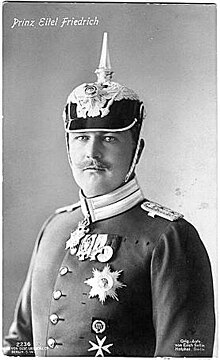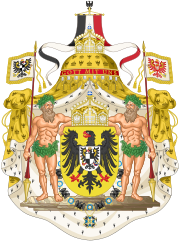Prince Eitel Friedrich of Prussia
| Eitel Friedrich | |
|---|---|
| Prince of Prussia | |
 Prince Eitel Friedrich as captain of the First Regiment of Foot Guards, Potsdam | |
| Born | 7 July 1883 Marmorpalais, Potsdam, Prussia |
| Died | 8 December 1942 (aged 59) Potsdam, Brandenburg |
| Burial | |
| Spouse | Duchess Sophia Charlotte of Oldenburg |
| House | Hohenzollern |
| Father | Wilhelm II, German Emperor |
| Mother | Augusta Victoria of Schleswig-Holstein |
| Prussian Royalty |
| House of Hohenzollern |
|---|
 |
| Wilhelm II |
Prince Eitel Friedrich of Prussia (Wilhelm Eitel Friedrich Christian Karl; 7 July 1883 – 8 December 1942) was the second son of Emperor Wilhelm II of Germany by his first wife, Augusta Viktoria of Schleswig-Holstein. He was born and died in Potsdam, Germany.
Life and activities
On 27 February 1906, Prince Eitel married Duchess Sophia Charlotte of Oldenburg (2 February 1879 Oldenburg – 29 March 1964 Westerstede) in Berlin. They were divorced on 20 October 1926 and had no children.
Raised at the cadet corps of Plön Castle, Prince Eitel was in the front line from the beginning of World War I and was wounded at Bapaume, where he commanded the Prussian First Foot Guards. He temporarily relinquished command to Count Hans von Blumenthal, but returned to duty before the end of the year. The following year, he was transferred to the Eastern Front. During the summer of 1915, he was out in a field in Russia when he had a chance encounter with Manfred von Richthofen, who had just crashed with his superior officer, Count Holck. The two men were hiding in a nearby tree line from what they thought was the advancing Russian army and who turned out to be the grenadiers, guardsmen, and officers of Prince Eitel.
After the war, he was engaged in monarchistic circles and the Stahlhelm paramilitary organization. In 1921, the Berlin criminal court found him guilty of the fraudulent transfer of 300,000 Marks and sentenced him to a fine of 5000 Marks.[1]
From 1907 to 1926, he was Master of the Knights (Herrenmeister) of the Order of St. John (Johanniterorden). He received the Pour le Mérite order in 1915. His body is buried at the Antique Temple in Sanssouci Park.
Regimental Commissions[2]
- Hauptman (captain) and commander of the Leibkompagnie (Life-company), 1. Garderegiment zu Fuß (1st Regiment of Foot Guards)
- à la suite, Grenadierregiment König Friedrich Wilhelm IV.(1. Pommersches) Nr. 2
- à la suite, 1. Gardelandwehrregiment (Guard Reserve Regiment)
- Hauptmann (captain), Austria-Hungary K.u.K. Infantry Regiment "Wilhelm I., Deutscher Kaiser und König von Preußen" Nr. 34
- Hauptmann (captain), Saxon Army
- à la suite, 7. Königsinfanterieregiment (King's Infantry Regiment) Nr. 106
- First Brigade of Imperial Guards, commander, 1914-15[3]
Chivalric Orders[2]
- Master of Knights, Order of Saint John (Bailiwick of Brandenburg) (appointed as 34th Master of Knights in 1907 and resigned in 1926 in favor of his brother, Prinz Oskar)
- Knight, Order of the Black Eagle
- Knight Grand Cross with Crown, Order of the Red Eagle
- Knight, First Class, Order of the Prussian Crown
- Knight Grand Commander, Royal House Order of Hohenzollern
- Honor Cross, First Class, Princely House Order of Hohenzollern
- Knight, Second Class, Imperial Order of the Double Dragon, China
- Knight, First Class with Crown, Mecklenburg Order of the Wendish Crown
- Knight, First Class, Order of the Netherlands Lion, Netherlands
- Knight Grand Cross (with Chain), Royal Norwegian Order of St. Olav, Norway
- Knight Grand Cross, Royal Hungarian Order of Saint Stephen, Empire of Austria-Hungary
- Knight, First Class, Order of the Lion and the Sun, Kingdom of Persia (Iran)
- Knight Grand Cross, Order of Tower & Sword, Portugal
- Knight Grand Cross, Order of the Romanian Crown, Kingdom of Romania
- Knight, Order of the Rue Crown, Kingdom of Saxony
- Knights of the Order of the Royal House of Chakri, Kingdom of Siam (Thailand)
- Knight Grand Cross, Order of the Crown of Siam, Kingdom of Siam (Thailand)
- Knight, Order of Glory, Ottoman Empire (Turkey)
- Knight, First Class (with diamonds), Osminieh Order, Ottoman Empire (Turkey)
- Knight Grand Cross, Order of the Württemberg Crown (1899)
- Cross of the Mount of Olives (1909)
- Knight of the Military Order of St. Henry (20 March 1915)
Two ships were named after Prince Eitel, the passenger ship Prince Eitel Friedrich (1901) and the Reich postal steamer Prince Eitel Friedrich (1904).
Military Decorations (1914-1918)
- Iron Cross, Second Class, ca. 1914
- Iron Cross, First Class, ca. 1914
- Pour le Mérite (22 March 1915); with Oak Leaves (14 May 1915)
Ancestry
Notes
- ^ Tucholsky: Awrumele Schabbesdeckel und Prinz Eitel-Friedrich von Hohenzollern at www.textlog.de
- ^ a b Schench, G. Handbuch über den Königlich Preuβischen Hof und Staat fur das Jahr 1908. Berlin, Prussia, 1907.
- ^ The American Library Annual. R.R. Bowker Co. 1915. p. 25.
Sources
Schench, G. Handbuch über den Königlich Preuβischen Hof und Staat fur das Jahr 1908. Berlin, Prussia, 1907.
- Prussian princes
- 1883 births
- 1942 deaths
- People from Potsdam
- House of Hohenzollern
- German Army generals of World War I
- Grand Crosses of the House Order of the Wendish Crown
- Recipients of the Order of the Black Eagle
- Grand Crosses of the Order of the Red Eagle
- Grand Commanders of the House Order of Hohenzollern
- Recipients of the Order of the Rue Crown
- Knights Grand Cross of the Order of the Crown (Württemberg)
- Recipients of the Iron Cross (1914), 1st class
- Recipients of the Pour le Mérite (military class)
- Honorary Knights Grand Cross of the Royal Victorian Order
- Knights of the Order of the Netherlands Lion
- Recipients of the Order of the Double Dragon
- Grand Cordons of the Order of the Lion and the Sun
- Grand Crosses of the Order of the Crown (Romania)
- Knights Grand Cross of the Order of the Crown of Thailand
- Grand Crosses of the Order of the Tower and Sword
- Knights of the Order of Glory (Ottoman Empire)
- Knights of the Order of the Royal House of Chakri
- Knights of the Military Order of St. Henry
- Major generals of Prussia
- Stahlhelm members
- German monarchists
- Royalty stubs
